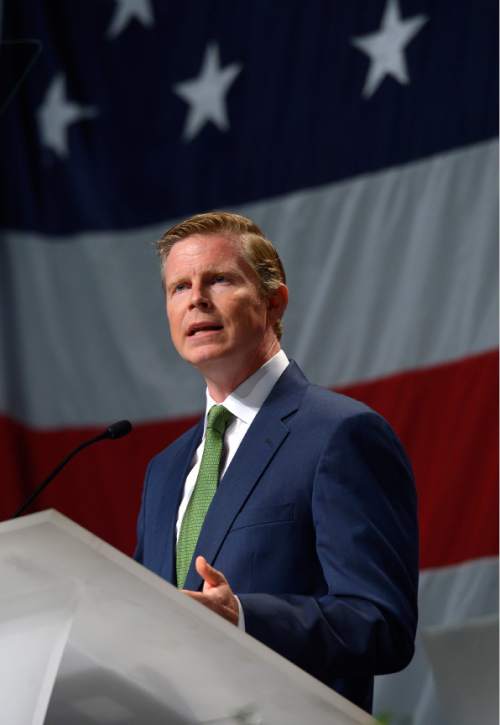This is an archived article that was published on sltrib.com in 2015, and information in the article may be outdated. It is provided only for personal research purposes and may not be reprinted.
Under Jonathan Johnson's leadership at Overstock.com, the company has socked away $10.9 million in gold and silver and has a three-month food supply for each employee, bracing for a financial crisis that the Republican gubernatorial candidate said is certain to come.
Johnson told the United Precious Metals Association — a group that was behind legislation to make gold legal tender in the state — that the company keeps small button-sized gold and silver coins outside the banking system.
"We expect when there is a financial crisis, there will be a banking holiday," Johnson, Overstock chairman of the board, told the group. "I don't know if it will be two days or two weeks or two months. But we have $10 million in gold and silver in denominations small enough … that we can use it for payroll. We want to be able to keep our employees paid [and] safe and our site up and running."
On Overstock's last quarterly report to the Securities and Exchange Commission, the company listed $10.9 million in "precious metals" among its assets — $6.3 million in gold and $4.6 million in silver.
The coins are stored at an off-site facility. The company lists the holdings as a risk, since the value of the stockpile depends on fluctuations in market rates. For the first six months of 2015, the company reported a $52,000 loss on its holdings.
"That's very unusual," said Scott Schaefer, a professor of finance at the David Eccles School of Business at the University of Utah. "I've not heard of a company stockpiling gold before."
Schaefer said businesses hedge against risk all the time — trading euros for dollars when there are concerns about the exchange rates, for example — and that is what Overstock is doing. But hedging risks can be expensive, so it makes sense only if the risk is likely enough to justify it, or the potential costs of not doing it are extremely high.
"It says something about the corporation's belief about the probability or cost of a bank holiday that the company is trying to hedge this risk by buying gold," Schaefer said.
Proponents of gold contend that the U.S. dollar is essentially worthless because it has not been backed by gold since 1971. Their concern is that the dollar will collapse and drive the international banking and economic system into chaos. When that happens, the theory goes, gold, silver and precious metals will become the only currency of value.
In 2011, Gov. Gary Herbert signed into law the Utah Legal Tender Act, which makes gold and silver legal tender for transactions. Since then, the United Precious Metals Association has sought to create a system in which gold can be deposited into private repositories that will then issue a credit card, drawing off the account. This year, American Express began issuing cards that draw from the gold and silver accounts.
Johnson said the company also has enough freeze-dried food — the product sold on the Overstock website — that the company could feed all of its employees and spouses for three months.
It is just part of Overstock's contingency planning in case the economy collapses, and Johnson says he would see to it the state took similar steps — although not necessarily stockpiling gold — if he is elected governor.
The state has set aside more than $528 million in various rainy-day funds, essentially savings accounts that were drawn on during the recession to help keep programs afloat.
Sasha Clark, spokeswoman for Johnson's campaign, said there are differences between what a private company and the state can do, and Johnson wouldn't necessarily like to see the state keep gold reserves.
Still, Johnson said he would like to see the state make contingency plans, much like Overstock has done, in case of a financial crisis.
"This is particularly important because of our unhealthy reliance on Washington, D.C., to meet our annual budget," Johnson said in a statement. "As governor, I'd oversee the creation of contingency plans if Washington, D.C., reduces or eliminates that $3.5-plus billion in funding."
Utah receives $3.8 billion of its roughly $14 billion annual budget from the federal government. The figure peaked at $4.3 billion in 2010, when the federal government was pumping money into states to try to revitalize the economy during the Great Recession.
The Legislature is already undertaking that task, creating the Utah Federal Funds Commission in 2013 to study what state government would have to do in the event of a reduction of up to 25 percent in the federal funds the state receives.
Herbert has said it's not true, however, that the state is more beholden to the federal government than in the past.
"That's a myth. The amount of money we have as far as federal dollars today in our current budget is a little over 25 percent," Herbert said during his monthly KUED news conference earlier this month. "The historic average over the last 20 years has been between 25 and 26 percent. We're not any more beholden to the federal government to get our money back to Utah today than we were 20 years ago."
The governor also pointed out that the state receives more money than taxpayers pay to Washington, because of money received for public lands, the state's military installations, and grants to colleges and universities.
"Utah is a recipient state," he said. "For every dollar we send back to Washington, D.C., we receive a dollar and seven cents back."
Twitter: @RobertGehrke





